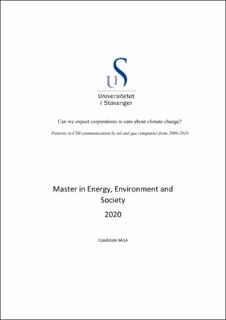| dc.description.abstract | Climate change represents one of the greatest challenges of our time, and in the recent decade, the attention of this issue has grown exponentially. The focus has to a large degree shifted from debating if human behaviour and greenhouse gas (GHG) emissions are affecting the climate, to debating what we can do to correct the damage. Youth strikes worldwide, consumer demands of disclosure and stakeholder and shareholder pressure has increased the pressure on corporations to face their part of the responsibility. Oil and gas companies hold a special position, as they are part of the problem by contributing to GHG-emissions, but at the same time possess knowledge and resource to help solve issues if technology can be utilized. This sector is also one of the most influential industries, and often closely aligned with political powers. Words creates attitudes, and senders who break through with their messages have power to influence with solutions they find most suitable. Consciousness around the language used by powerful institutions like oil and gas companies is therefore highly relevant for the green transition.
The purpose of this thesis is to explore how oil and gas companies in Norway communicate CSR-messages when it comes to climate responsibilities and climate risks, and to show how this has developed in the last decade in general, and after the Paris Agreement specifically.
This project was focused around exploring how oil and gas companies communicate and conceptualize climate challenge. The findings show that there is a change in patterns of corporate social responsibility (CSR) messages in the ten-year-period studied. Climate change is initially portrayed as a crisis that will happen in the future, which can be tackled with technology. However, throughout the period climate change is increasingly portrayed as a risk factor and an “unpredictable agent” (Jaworska, 2018). The analysis was performed using framing theory, and two additional frames were introduced, supplementing existing literature. The analysis also shows that a re-framing of climate change by oil and gas companies has occurred during the recent decade. In the beginning climate change is framed as a sustainability issue, while in the end of the period it is increasingly framed as a financial issue. Following the theoretical rationale of corporations engaging in CSR activity either because it is the right thing to do or because they benefit from it (or fear being punished for not doing it), this analysis points towards these oil and gas companies being influenced by extrinsic motivators (e.g., market and institutional pressures) and expected benefits.
The great shift in climate change communication happened around 2015/2016, and coincides with the introduction of the term “climate risk”. I therefor argue that when the companies realise that the climate crisis represents an existential crisis for them and shareholder and stakeholder pressure increase, the messaging changes from protecting the status quo into plans of action and a larger degree of quantified commitments. This points at the Paris Agreement influencing how these companies frame climate change. The main trigger seems to be shareholder pressure, and one can therefor conclude that the CSR-messaging from oil and gas companies are mainly economically – and not philanthropically – driven in the time period studied. | en_US |
